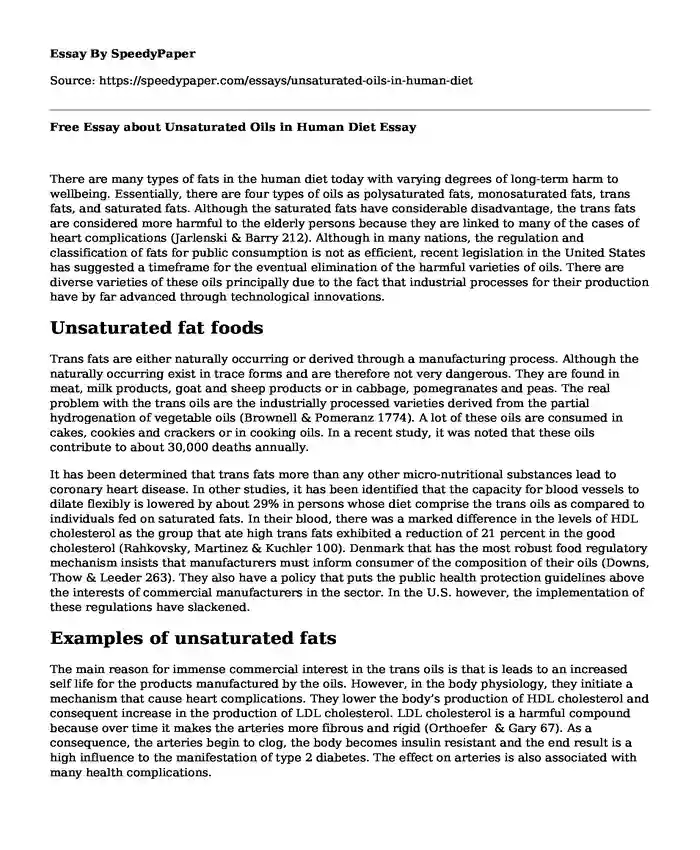
| Type of paper: | Essay |
| Categories: | Health and Social Care Food Diet |
| Pages: | 3 |
| Wordcount: | 721 words |
There are many types of fats in the human diet today with varying degrees of long-term harm to wellbeing. Essentially, there are four types of oils as polysaturated fats, monosaturated fats, trans fats, and saturated fats. Although the saturated fats have considerable disadvantage, the trans fats are considered more harmful to the elderly persons because they are linked to many of the cases of heart complications (Jarlenski & Barry 212). Although in many nations, the regulation and classification of fats for public consumption is not as efficient, recent legislation in the United States has suggested a timeframe for the eventual elimination of the harmful varieties of oils. There are diverse varieties of these oils principally due to the fact that industrial processes for their production have by far advanced through technological innovations.
Unsaturated fat foods
Trans fats are either naturally occurring or derived through a manufacturing process. Although the naturally occurring exist in trace forms and are therefore not very dangerous. They are found in meat, milk products, goat and sheep products or in cabbage, pomegranates and peas. The real problem with the trans oils are the industrially processed varieties derived from the partial hydrogenation of vegetable oils (Brownell & Pomeranz 1774). A lot of these oils are consumed in cakes, cookies and crackers or in cooking oils. In a recent study, it was noted that these oils contribute to about 30,000 deaths annually.
It has been determined that trans fats more than any other micro-nutritional substances lead to coronary heart disease. In other studies, it has been identified that the capacity for blood vessels to dilate flexibly is lowered by about 29% in persons whose diet comprise the trans oils as compared to individuals fed on saturated fats. In their blood, there was a marked difference in the levels of HDL cholesterol as the group that ate high trans fats exhibited a reduction of 21 percent in the good cholesterol (Rahkovsky, Martinez & Kuchler 100). Denmark that has the most robust food regulatory mechanism insists that manufacturers must inform consumer of the composition of their oils (Downs, Thow & Leeder 263). They also have a policy that puts the public health protection guidelines above the interests of commercial manufacturers in the sector. In the U.S. however, the implementation of these regulations have slackened.
Examples of unsaturated fats
The main reason for immense commercial interest in the trans oils is that is leads to an increased self life for the products manufactured by the oils. However, in the body physiology, they initiate a mechanism that cause heart complications. They lower the body’s production of HDL cholesterol and consequent increase in the production of LDL cholesterol. LDL cholesterol is a harmful compound because over time it makes the arteries more fibrous and rigid (Orthoefer & Gary 67). As a consequence, the arteries begin to clog, the body becomes insulin resistant and the end result is a high influence to the manifestation of type 2 diabetes. The effect on arteries is also associated with many health complications.
Many American dietary and nutritional organizations as well as the Health Department recommend that people eat dietary schemes composed of a lot of fruits and vegetables, poultry, fish, nuts and whole grains because they have low levels of the trans oils. It is also recommended that people use more of soft margarine as opposed to butter. For this reason also, the long life cookies like doughnuts, crackers, pies and muffins are discouraged. In conclusion, the trans oils should be reduced as much as possible for better health and wellbeing.
Works Cited
Brownell, Kelly D., and Jennifer L. Pomeranz. "The trans-fat ban—food regulation and long- term health." New England Journal of Medicine 370.19 (2014): 1773-1775.
Downs, Shauna M., Anne Marie Thow, and Stephen R. Leeder. "The effectiveness of policies for reducing dietary trans fat: a systematic review of the evidence." Bulletin of the World Health Organization 91.4 (2013): 262-269h.
Jarlenski, Marian, and Colleen L. Barry. "News media coverage of trans fat: Health risks and policy responses." Health communication 28.3 (2013): 209-216.
Orthoefer, Frank T., and Gary R. List. Trait-Modified Oils in Foods. John Wiley & Sons, 2015.
Rahkovsky, Ilya, Steve W. Martinez, and Fred Kuchler. New food choices free of trans fats better align US diets with health recommendations. US Department of Agriculture, Economic Research Service, 2012.
Cite this page
Free Essay about Unsaturated Oils in Human Diet. (2017, Nov 27). Retrieved from https://speedypaper.net/essays/unsaturated-oils-in-human-diet
Request Removal
If you are the original author of this essay and no longer wish to have it published on the SpeedyPaper website, please click below to request its removal:
- Essay Example Describing the Nature of Social Mobility
- Movie Essay Example: Theoretical Analysis of American History X
- The Race Debate in the Recitatif by the Toni Morrison
- Free Essay Sample on Apple's Marketing Strategy
- Free Essay Example on the Project South
- Free Paper on Criminal Justice: Case Study 3 - Arson and Murder
- Essay Example on Chinese Social Cultural Issues and Regional Disparity
Popular categories




